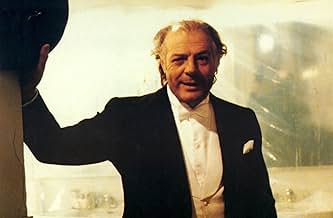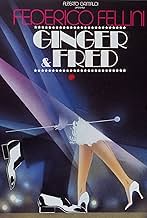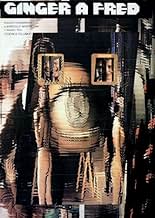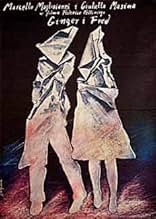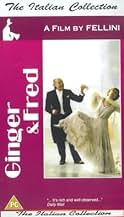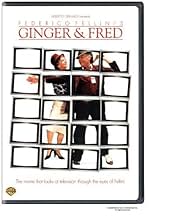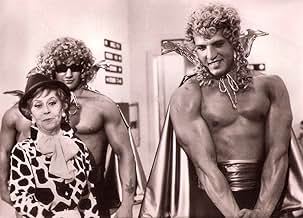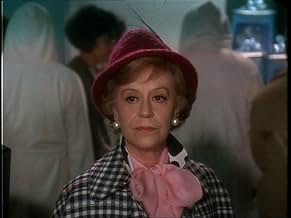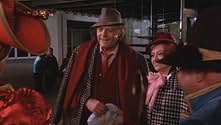NOTE IMDb
7,2/10
5,8 k
MA NOTE
Amelia et Pippo sont réunis après des dizaines d'années pour interpréter leur ancien numéro de music-hall dans une émission de télévision.Amelia et Pippo sont réunis après des dizaines d'années pour interpréter leur ancien numéro de music-hall dans une émission de télévision.Amelia et Pippo sont réunis après des dizaines d'années pour interpréter leur ancien numéro de music-hall dans une émission de télévision.
- Réalisation
- Scénario
- Casting principal
- Nomination aux 1 BAFTA Award
- 18 victoires et 18 nominations au total
Friedrich von Ledebur
- Admiral Aulenti
- (as Frederick Ledebur)
Jacques Henri Lartigue
- Brother Gerolamo
- (as Jacques Henry Lartigue)
Totò Mignone
- Totò
- (as Toto Mignone)
Antoine Saint-John
- Bandaged man
- (as Antoine Saint Jean)
Friedrich von Thun
- Kidnapped Industrialist
- (as Frederich Thun)
Antonino Iuorio
- Production Inspector
- (as Antonio Iuorio)
Avis à la une
Fellini is perhaps the only director whose movies could never be adapted into books. The Maestro has invented a purely cinematic language to speak his own heart and tell his stories no matter how disjointed and anarchic they were for the discoverer, I guess his unique style would simply suffocate inside the restrictive format of words. Sure, drawings can give glimpses on his extravagant visions but still too static to convey the sense of fun and buoyancy he injects in his material. They could make interesting comic strips though but would they work the same without Nino Rota or Nicola Piavani's music?
Fellini movies are made for either the stage or the screen, their delights are essentially visual and musical, their enjoyment works on a sensitive and emotional rather than intellectual level. This is the old magic formula that made glorious days of Hollywood and Broadway, providing the kind of entertainment books and radio couldn't, that era immortalized by Chaplin, Laurel and Hardy, Walt Disney cartoons and of course musicals, and one of the most emblematic moments of that long gone period is Fred Astaire and Ginger Rogers dancing "Cheek to Cheek". That heavenly scene immortalized by countless homages, notably from "The Green Mile" and Woody Allen's "Purple Rose of Cairo".
Fellini's "Ginger and Fred" is impregnated with a similar dose of nostalgia although we never see the legends, we don't need their last names, we don't need the lyrics to remember "Top Hat", we don't need Giuletta Masina to look like Ginger Rogers and she doesn't even pretend to be a lookalike while Marcello Mastroianni isn't exactly the thin and slender Astaire type. Yet the two Hollywood stars bright through the sole passion of Amelia (Masina) and Pippo (Mastroianni). Listen to her describing the choreography or her days of glory during interviews or Pippo, in one of the film's most inspired scenes, explaining the origins of tap dancing. Their listeners aren't always captivated but we know they're not talking to them but to us movie lovers fascinated by these Last Mohicans of Hollywood Golden Age... Italian style.
The homage itself is pure Fellini style, any lesser director would have made this love letter to Hollywood a sort of solemn prosternation... watching "Ginger and Fred" made me realize how willing even good movies like "The Artist" or "La La Land" were to recreate the magic at the expense of their personal touch, sinning by moments of sentimental manipulation. "Ginger and Fred" is nostalgic all right, but it's exuberant and transgressive like any Fellini film. The director turns the couple into decoy protagonists in a crazy universe, an avalanche of debauchery that makes them totally outdated. Behind the nostalgia, there's a commentary on how far the art of entertainment went, becoming as decadent as his portrayal of Rome like in "Satyricon". Good directors flash the lost innocence before our eyes, Fellini focuses on the much groovier hell.
What is the place of a tap dancing couple in a world where TV and pop electronic music waters its audience with a keleidoscope of sex, games, ads and random images designed to ignite masses lowest instincts? When Amelia is approached by an unimpressed journalist and driven to the hotel before the studio representation, she is surrounded by so many characters her frailty is enhanced: has-been artists, lookalikes, impersonators, dwarves... what have they in common? They're just weird, bizarre-looking or entertaining in a non-traditional way. It's eerie how Fellini prophecized the reality shows and their exploitations of wannabe celebrities and pseudo artists treated like freaks. There's a scene where Amelia is asked whether she's married to Pippo, if she was, that would have interested the audience even more. There's no place anymore for genuine interest, people want to be shocked, dazzled, or surprised, it's a giant leap made in five decades.
Having a foot in each world and being a true ringmaster, Fellini reconciles these two schools of entertainment, allowing within that orgy of telegenic bizarreness a few breaks to Amelia and Pippo, I didn't mind these crazy vignettes as they're part of the Fellinian experience but sometimes they can be too exhausting and so I enjoyed these brief moments of truce where Amelia and Pippo shared a few memories. I loved their complicity all through their film and one of the masterstrokes was the blackout before the act, so we could breath a little and listen to them commenting the mess surrounding them. It's interesting to see that they're lucid about their status, but they are willing to give the audience what they want, for the sake of their art. For all its anarchical structure, carried by that catchy soundtrack, Fellini can't resist the temptation of sentimentalism and that's a wise choice, as he allows his two fetish actors to have a substantial role at the dawn of their career, he even recast Franco Fabrizi as the host show, he who starred in his early neo-realist films.
In its "final show before the curtain closes" undertones, "Ginger and Fred" reminded me of Chaplin's "Limelight". The film has its slower moments but it's surprisingly grabbing and never dull or boring, Amelia and Pippo gravitate around these bizarre figures of entertainments like a Greek chorus we can relate to. At the end, they become Ginger and Fred in our hearts. And the film ends as it started, but at night in a deserted train station, with the two actors paying the kind of goodbyes that resonate like poignant farewells. But at long as they saw each other, that mess was all worth it, and since there's no Fellini film without the "film in the film" element, at least Il Dottore gratified us with a last reunion with his fetish actors: Masina and Mastroianni ... if only for that, "Ginger and Fred" deserves to be watched and appreciated.
Fellini movies are made for either the stage or the screen, their delights are essentially visual and musical, their enjoyment works on a sensitive and emotional rather than intellectual level. This is the old magic formula that made glorious days of Hollywood and Broadway, providing the kind of entertainment books and radio couldn't, that era immortalized by Chaplin, Laurel and Hardy, Walt Disney cartoons and of course musicals, and one of the most emblematic moments of that long gone period is Fred Astaire and Ginger Rogers dancing "Cheek to Cheek". That heavenly scene immortalized by countless homages, notably from "The Green Mile" and Woody Allen's "Purple Rose of Cairo".
Fellini's "Ginger and Fred" is impregnated with a similar dose of nostalgia although we never see the legends, we don't need their last names, we don't need the lyrics to remember "Top Hat", we don't need Giuletta Masina to look like Ginger Rogers and she doesn't even pretend to be a lookalike while Marcello Mastroianni isn't exactly the thin and slender Astaire type. Yet the two Hollywood stars bright through the sole passion of Amelia (Masina) and Pippo (Mastroianni). Listen to her describing the choreography or her days of glory during interviews or Pippo, in one of the film's most inspired scenes, explaining the origins of tap dancing. Their listeners aren't always captivated but we know they're not talking to them but to us movie lovers fascinated by these Last Mohicans of Hollywood Golden Age... Italian style.
The homage itself is pure Fellini style, any lesser director would have made this love letter to Hollywood a sort of solemn prosternation... watching "Ginger and Fred" made me realize how willing even good movies like "The Artist" or "La La Land" were to recreate the magic at the expense of their personal touch, sinning by moments of sentimental manipulation. "Ginger and Fred" is nostalgic all right, but it's exuberant and transgressive like any Fellini film. The director turns the couple into decoy protagonists in a crazy universe, an avalanche of debauchery that makes them totally outdated. Behind the nostalgia, there's a commentary on how far the art of entertainment went, becoming as decadent as his portrayal of Rome like in "Satyricon". Good directors flash the lost innocence before our eyes, Fellini focuses on the much groovier hell.
What is the place of a tap dancing couple in a world where TV and pop electronic music waters its audience with a keleidoscope of sex, games, ads and random images designed to ignite masses lowest instincts? When Amelia is approached by an unimpressed journalist and driven to the hotel before the studio representation, she is surrounded by so many characters her frailty is enhanced: has-been artists, lookalikes, impersonators, dwarves... what have they in common? They're just weird, bizarre-looking or entertaining in a non-traditional way. It's eerie how Fellini prophecized the reality shows and their exploitations of wannabe celebrities and pseudo artists treated like freaks. There's a scene where Amelia is asked whether she's married to Pippo, if she was, that would have interested the audience even more. There's no place anymore for genuine interest, people want to be shocked, dazzled, or surprised, it's a giant leap made in five decades.
Having a foot in each world and being a true ringmaster, Fellini reconciles these two schools of entertainment, allowing within that orgy of telegenic bizarreness a few breaks to Amelia and Pippo, I didn't mind these crazy vignettes as they're part of the Fellinian experience but sometimes they can be too exhausting and so I enjoyed these brief moments of truce where Amelia and Pippo shared a few memories. I loved their complicity all through their film and one of the masterstrokes was the blackout before the act, so we could breath a little and listen to them commenting the mess surrounding them. It's interesting to see that they're lucid about their status, but they are willing to give the audience what they want, for the sake of their art. For all its anarchical structure, carried by that catchy soundtrack, Fellini can't resist the temptation of sentimentalism and that's a wise choice, as he allows his two fetish actors to have a substantial role at the dawn of their career, he even recast Franco Fabrizi as the host show, he who starred in his early neo-realist films.
In its "final show before the curtain closes" undertones, "Ginger and Fred" reminded me of Chaplin's "Limelight". The film has its slower moments but it's surprisingly grabbing and never dull or boring, Amelia and Pippo gravitate around these bizarre figures of entertainments like a Greek chorus we can relate to. At the end, they become Ginger and Fred in our hearts. And the film ends as it started, but at night in a deserted train station, with the two actors paying the kind of goodbyes that resonate like poignant farewells. But at long as they saw each other, that mess was all worth it, and since there's no Fellini film without the "film in the film" element, at least Il Dottore gratified us with a last reunion with his fetish actors: Masina and Mastroianni ... if only for that, "Ginger and Fred" deserves to be watched and appreciated.
Before I saw this movie, I had heard how it was considered one of Federico Fellini's more accessible movies. If this was meant of Fellini's films from the sixties on, I can agree with that. The film is basically two things: one big jab at television and giving Giuletta Masina the opportunity to show everyone how adorable she is (she succeeds). The TV angle, however scathing it may have been in 1986; today with the plethora of reality TV shows, the film just seems prescient. The film's very basic storyline is Masina reuniting with old dance partner Marcello Mastroianni for a TV show. Filling in the rest of the movie (and sometimes obscuring the main story) are the many oddball characters scheduled for the TV show. As anyone familiar with Fellini knows, he loves outrageous people. In this film, for example, there are transsexuals, psychics, a midget troupe and a cow with many teats. The first part of the movie, at the hotel, is a little too much because everything is thrown at the viewer at once. The characters, television, Ginger and Fred, all vie for your attention and it can be overwhelming. Once at the studio, the film kind of settles down and one is able to enjoy the film and it's characters. Not one of Fellini's best but also not only for fanatics of Fellini either.
I think this is the last great Federico Fellini picture. Maybe it's not as classic as "I vitelloni", "La strada", "Le notti di Cabiria", "La dolce vita", "Otto e mezzo" and "Amarcord", but it's a return to a more comedy style and it's one of the most accessible works of the Maestro as well.
"Ginger e Fred" (1985) comes after a series of more experimental films from Fellini. In this satirical comedy about TV power, a couple of old dancers reunite for a Christmas show. They enter a world where everything is taken for making audience, the two and their art are just caricatures... But who cares? The only important thing is audience.
In this feature Fellini warns about TV dangers -in a very sarcastic way he anticipates what TV is today with all these Reality shows.
The film is a typical Fellini picture -the story has not a real plot, it's a voyage where strange people (also in a physical way!) meet, we always can find exaggerated and ambiguous situations...
At the same time there's a lot of tenderness between the two dancers, superbly played by Marcello Mastroianni (who starred in several Fellini works) and Giulietta Masina (the actual Fellini's wife). It's useless to say that the chemistry between the two main actors is rally great.
It's quite a nostalgic movie -it seems that Fellini looks back and thinks about a world in which fantasy and creativity could be expressed in a better way, whereas TV kills everything.
The two subsequent films of the Italian director ("Intervista" and "La voce della luna") are rather minor -although poetic they're not as fresh and simple as "Ginger e Fred".
We miss Federico, Giulietta and Marcello.
"Ginger e Fred" (1985) comes after a series of more experimental films from Fellini. In this satirical comedy about TV power, a couple of old dancers reunite for a Christmas show. They enter a world where everything is taken for making audience, the two and their art are just caricatures... But who cares? The only important thing is audience.
In this feature Fellini warns about TV dangers -in a very sarcastic way he anticipates what TV is today with all these Reality shows.
The film is a typical Fellini picture -the story has not a real plot, it's a voyage where strange people (also in a physical way!) meet, we always can find exaggerated and ambiguous situations...
At the same time there's a lot of tenderness between the two dancers, superbly played by Marcello Mastroianni (who starred in several Fellini works) and Giulietta Masina (the actual Fellini's wife). It's useless to say that the chemistry between the two main actors is rally great.
It's quite a nostalgic movie -it seems that Fellini looks back and thinks about a world in which fantasy and creativity could be expressed in a better way, whereas TV kills everything.
The two subsequent films of the Italian director ("Intervista" and "La voce della luna") are rather minor -although poetic they're not as fresh and simple as "Ginger e Fred".
We miss Federico, Giulietta and Marcello.
Marcello Mastroianni and Giulietta Masina star in "Ginger and Fred" from 1986, directed by Federico Fellini.
Amelia and Pippo once had a successful act imitating Fred and Ginger. Thirty years after their act, they are asked to dance in a special Christmas show for TV called "We Are Proud To Present."
It's a real freak show with the most bizarre acts you've ever seen, including a priest who left the priesthood and is now engaged, a man of the cloth who can levitate himself, lookalikes - some very strange acts.
Amelia and Pippo not only danced together but were involved. However Amelia married, had a daughter and is now widowed. Pippo married as well.
Amelia is worried that Pippo isn't up to the dancing, and when the power goes out in the theater, the two consider bolting.
Bittersweet film with marvelous acting and real chemistry between the two.
Masina was married to Fellini and died five months after he did.
Amelia and Pippo once had a successful act imitating Fred and Ginger. Thirty years after their act, they are asked to dance in a special Christmas show for TV called "We Are Proud To Present."
It's a real freak show with the most bizarre acts you've ever seen, including a priest who left the priesthood and is now engaged, a man of the cloth who can levitate himself, lookalikes - some very strange acts.
Amelia and Pippo not only danced together but were involved. However Amelia married, had a daughter and is now widowed. Pippo married as well.
Amelia is worried that Pippo isn't up to the dancing, and when the power goes out in the theater, the two consider bolting.
Bittersweet film with marvelous acting and real chemistry between the two.
Masina was married to Fellini and died five months after he did.
Fellini takes a stab at television in this wonderful satire. It's Christmas, and an Italian "Ed Sullivan" type show is having a special, by re-uniting acts that were featured years ago. There is a hilarious (for those in the know) swipe at Woody Allen, who has been parodying Fellini for years. It's a bit deliberately paced, but the chemistry between the stars makes it worthwhile.
Le saviez-vous
- AnecdotesUpon the film's release in the USA, Ginger Rogers sued the production and the distributors for 'misappropriation and infringement of her public personality'. The case was dismissed, the judgment stating that the film referred to her and Fred Astaire only obliquely.
- Citations
Pippo Botticella: Unquestionably, we descend from the apes. The trouble is we can't get back to them, to their gift of instinct, of natural innocence.
- ConnexionsFeatured in At the Movies: The Money Pit/Ginger and Fred (1986)
Meilleurs choix
Connectez-vous pour évaluer et suivre la liste de favoris afin de recevoir des recommandations personnalisées
- How long is Ginger & Fred?Alimenté par Alexa
Détails
- Date de sortie
- Pays d’origine
- Langues
- Aussi connu sous le nom de
- Ginger & Fred
- Lieux de tournage
- Sociétés de production
- Voir plus de crédits d'entreprise sur IMDbPro
Box-office
- Montant brut aux États-Unis et au Canada
- 837 623 $US
- Week-end de sortie aux États-Unis et au Canada
- 22 725 $US
- 30 mars 1986
- Montant brut mondial
- 837 953 $US
Contribuer à cette page
Suggérer une modification ou ajouter du contenu manquant

Lacune principale
By what name was Ginger et Fred (1986) officially released in India in English?
Répondre

